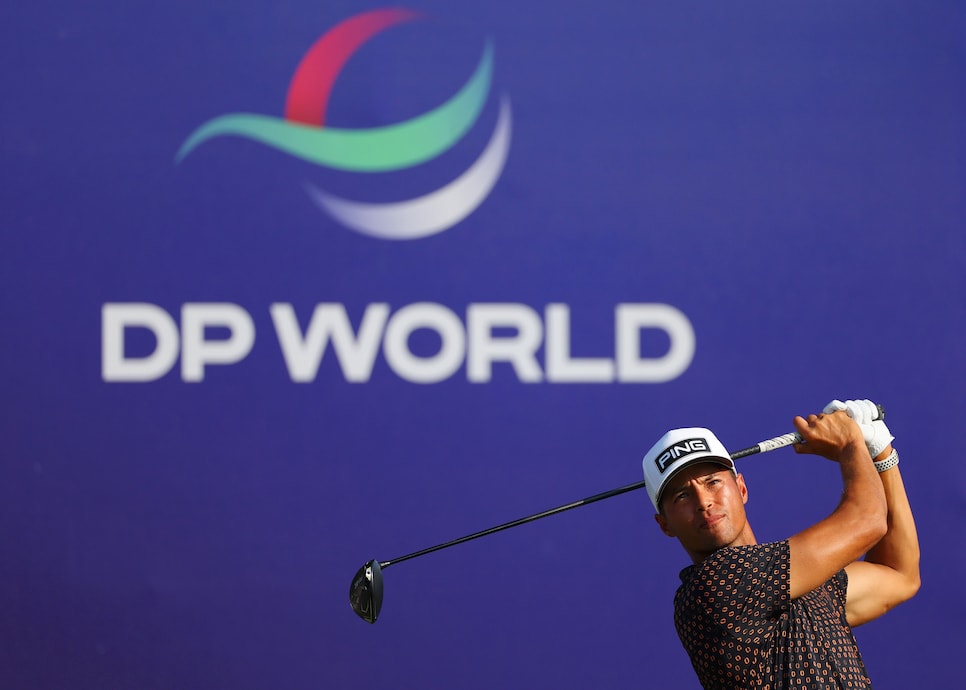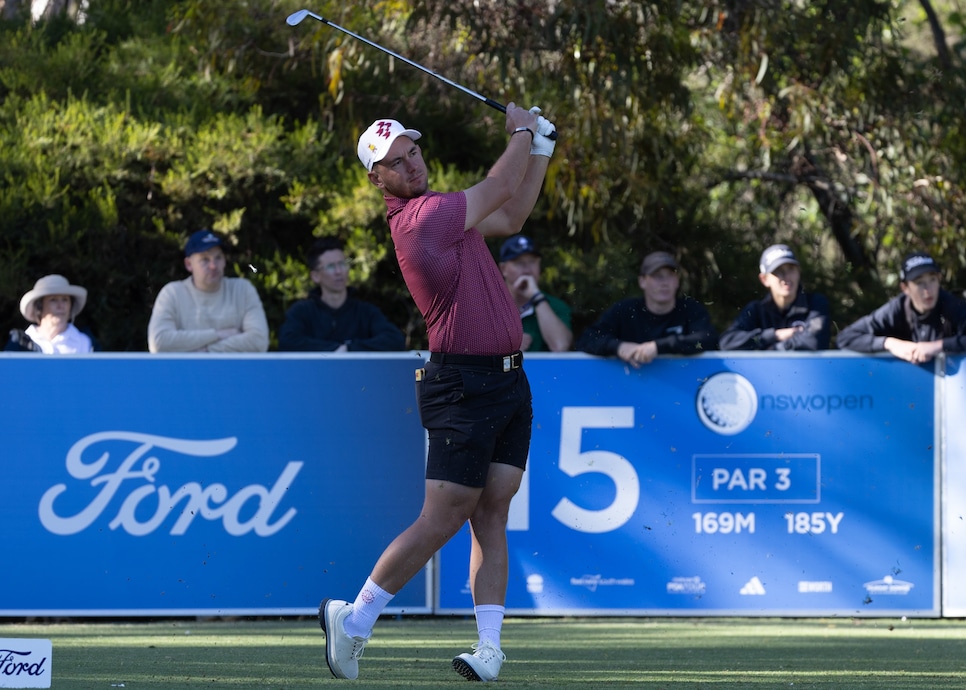The best-case scenario for Rory McIlroy after Pinehurst – Australian Golf Digest

- by Admin
- June 19, 2024
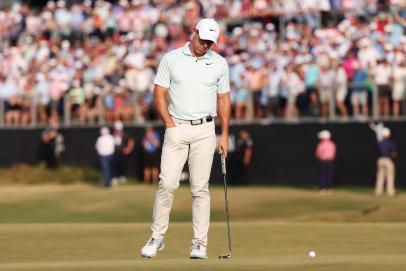
Let’s take a breath. It’s been a few days now, time to take a longer view of Rory McIlroy’s excruciating failure at Pinehurst in a one-shot loss to Bryson DeChambeau.
Not to say the raw shock of the jerkily pulled two-and-a-half footer on the 70th hole and the weakly hit miss from three-foot, nine-inches on the 72nd hole won’t endure through countless media replays, and possibly even more inside McIlroy’s head. As Nick Faldo said, “That’s going to haunt Rory for the rest of his life, those two misses.”
And we are still recovering from the cruel tease of McIlroy having his long awaited turning point moment: a first major in ten years and his fifth overall, signalling a second prime for a more mature, more skilled, more confident player, finally unleashed for a run toward the all-time status that seemed his destiny when he had four majors by age 25.
But at least the doomsday reaction that McIlroy is through as a top player should have run its course.
Plenty of questions remain, of course. Chiefly, how will McIlroy react? Beyond the immediate despondence that led him to decline speaking to reporters and then withdrawing from this week’s Travelers Championship, McIlroy is working on the answers during his three-week break before returning to play at the Genesis Scottish Open.
Will he be discouraged or revitalized, privately resigned to the idea that closing a major will always be a monumental mental task and perhaps even too big, or eager to once again get in the arena and risk more heartbreak for the chance at glory.
More on Rory McIlroy Opportunity Lost U.S. Open 2024: Rory McIlroy and the newest shade of heartbreak
Which leads to a novel idea. Is it possible what happened to McIlroy will be a net positive? After all, for major championship winners, hard losses are just part of the cost of doing business. McIlroy definitely leaned that way in his day-after post on X. While conceding that what happened on No. 2 was the toughest loss of his 17-year professional career, he also wrote, “The one word I would describe my career as is resilient.” And added, “I feel closer to winning my next major championship than I ever have.”
The argument that McIlroy is actually on an upward curve may seem absurd at the moment, but the fact is the Northern Irishman did a great many things superbly at Pinehurst, where he played his best U.S. Open since winning by eight strokes so seemingly long ago in 2011.
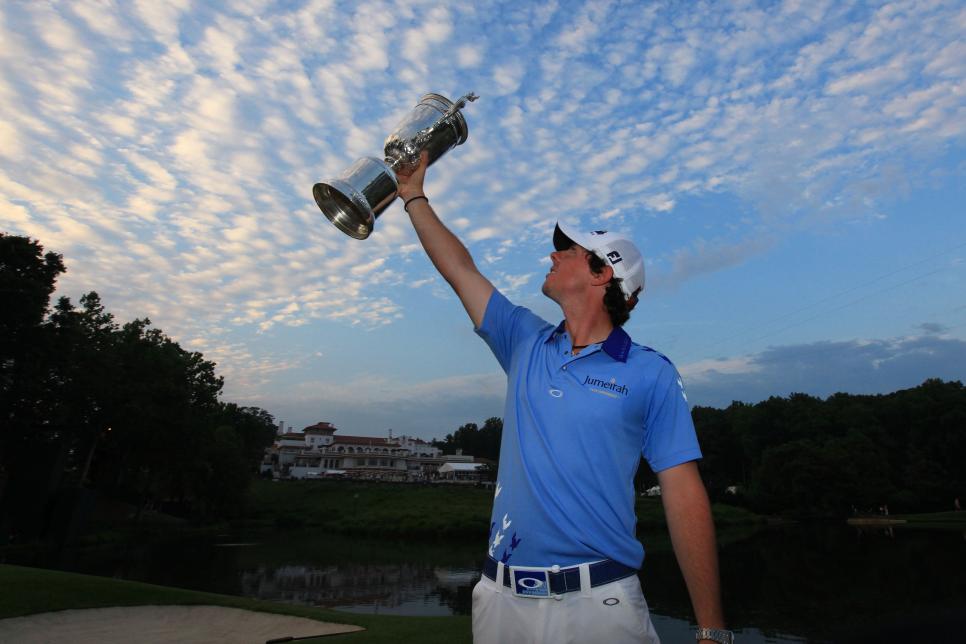
David Cannon
That Open at Congressional was unusually wet. In the ensuing years McIlroy would concede that fast and firm conditions gave him trouble, emphasized by three straight missed cuts in the U.S. Open beginning in 2016. But before the first round at Pinehurst he issued an impromptu manifesto detailing the remarkable progress he’s made in the championship since with six straight top 10s.
Will he be discouraged or revitalized, privately resigned to the idea that closing a major will always be a monumental mental task?
“Embracing the difficult conditions,” he said to a question from broadcaster Gary Williams. “Embracing the style of golf needed to contend. Embracing patience. Honestly, embracing what I would have called boring back in the day. Explosiveness is not going to win a US Open. It’s more methodically building your score over the course of four days and being OK with that.”
On fast and firm No. 2, he played solid golf so steady it almost bordered on boring. He would finish the championship ranked first in strokes gained off the tee, achieved by ranking second in driving distance his 335.6 yards, only two yards behind DeChambeau, and a remarkable third in driving accuracy, hitting 48 of 56 fairways. He was also fourth in greens in regulation with 48 out of 72.
Indeed, over four rounds McIlroy statistically outplayed DeChambeau tee to green, including strokes gained around the green, surprising considering how well the winner chipped and got up and down. But just as he was by Cameron Smith at St. Andrews in 2022, and Wyndham Clark last at the LACC, McIlroy got outputted. DeChambeau finished 12th in putting for the championship, to McIlroy’s 27th, picking up better than 4½ on the field, about two strokes better than McIlroy.
Although ironically, on Sunday it was McIlroy who statistically outputted DeChambeau, making four birdie putts of at least 18 feet. It was the main reason, along with hitting 10 of the first 11 fairways, that he had had a two-stroke lead with five to play.
But this is where McIlroy fell down. Not for the first time, his answer to the question Tom Watson used to searchingly wonder about his competitors when championship tension peaked—“Can you handle it?”, was “No.” On full shots, McIlroy would miss two of the last three fairways, as well as the par three 15th and 17th greens. It was the kind of lapse in focus at the key moment that former European Ryder Cup captain and current commentator Paul McGinley maintains have too often thrust McIlroy into pressurized situations that would be avoided with better concentration.
To McGinley, the fateful short putt on the 70th hole— the shortest putt McIlroy has missed this year on the PGA Tour and coming after a seemingly solid birdie attempt from 27 feet – was a result of the shakiness McIlroy began to exhibit after a starting low pull hook with a driver off the 14th tee.
But more glaring, and harder to watch, were the missed short putts. The inability to effectively execute the smallest of motions at the biggest of moments always engenders extra judgment, by critics and the competitor in question, as mental fortitude and character get doubted. It’s the way that the humbling game humiliates best, haunts the longest, hurts the most.
And yes, late short misses in majors can ruin careers. The epitome remains Doug Sanders’ sad push on the 72ndhole at St. Andrews in 1970. But tragic as it was, Sanders was 36 and on the downside of his career. Arguably more devastating was the case of Tony Jacklin, only 28 and a two-time major champion when his sudden pull from three feet on the 71st hole of the 1972 Open at Muirfield, coming after Lee Trevino chipped in, cost him the lead and the championship. He never finished in the top 10 of a major again. “The bottom fell out of my game,” he said.
It might be more crucial than ever to find a way to love the game—even, and maybe especially, the part that causes pain.
But there are many more who bounced back. Ben Hogan in 1946 and Sam Snead in 1947 each missed three-footers on the final hole of the U.S. Open, then went on to collectively win 14 majors. Davis Love III missed a shorty to tie at the 1996 U.S. Open but recovered to win the PGA the next year. Dustin Johnson three-putted from 15 feet on the 72nd hole of the U.S. Open at Chambers Bay to miss a playoff, only to win the next year at Oakmont.
McIlroy among multiple major winners has never been considered the most reliable at holing out, given to careless and nervous moments in ways that Nicklaus and Woods never have been. He’s gotten more solid and consistent in recent years, but reverted to an old weakness under the intense psychological heat of last Sunday.
Will McIlroy bounce back? At 35, he’s been going hard for a long time, but he’s certainly showed no physical signs of decline. Hogan won eight of his nine after 35, and more contemporaneously, Phil Mickelson won five of his six after age 35.
Out of respect, but also support for a wounded comrade, his peers are saying he will.
“I think that fire in him is only going to continue to grow,” said DeChambeau. “He’s going to win more major championships.”
Padraig Harrington opined that McIlroy at Pinehurst was “as good as he’s ever been. A couple of missed putts on treacherous greens should not stop him from taking positives from the week.”
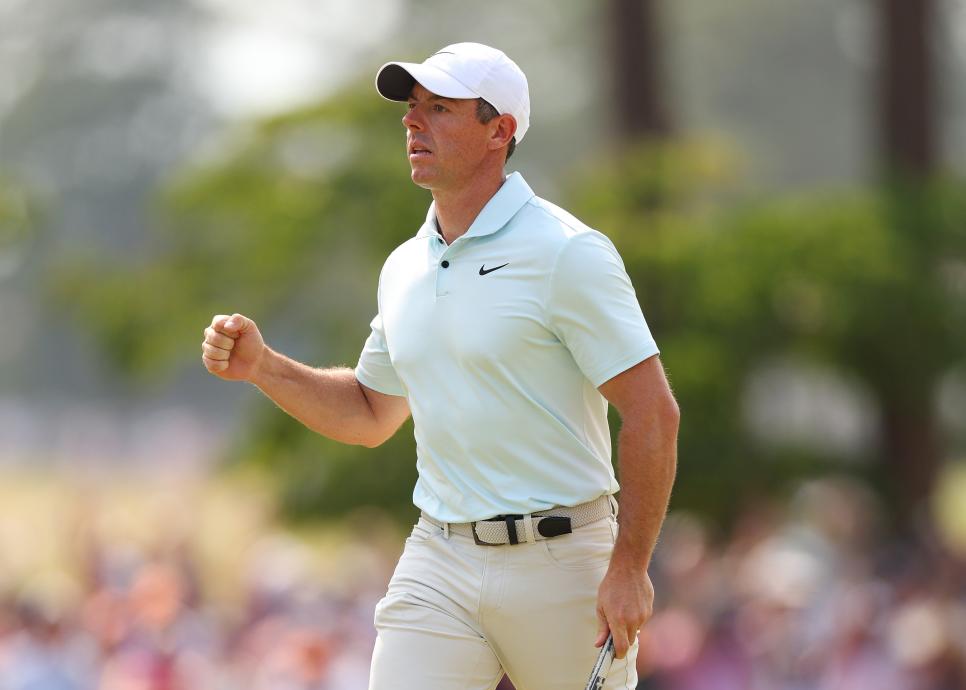
Andrew Redington
Among today’s players, the 53-year-old Harrington is perhaps the most overt lover of the game. Indeed, he loves every part of it, even the part that happened to McIlroy. On the eve of being inducted into the World Golf Hall of Fame last week, he told Adam Schupak of Golfweek, “Probably the greatest trait I have is I’m an optimist. Like everyone else, I’ve lost tournaments and you’re miserable on the Sunday evening when you’ve lost. But the minute I get to the golf course I’m dreaming, I’m hopeful…You really do believe that anything can happen.” Asked if there were any he regretted, he said, “None of them bother me.”
Which makes McIlroy’s statement last week that Harrington “probably loves the game of golf more than I do, in some ways” ring true. Not that McIlroy isn’t capable putting disappointment behind him. He pointed out that after last year’s disappointing loss to Clark, he won the next time he played, at the very Scottish Open where he will is scheduled to reemerge. “I’ve played enough golf tournaments in my career, that once it’s done, it’s done,” he said. “You leave it in the past, try to learn from whatever happened that given week…There’s always the opportunity to get back up on the horse and try again.”
But the years have taken their toll. At the moment, McIlroy’s biggest challenge might be accessing the joy that he exhibited growing up with golf in Northern Ireland. The quality was wryly captured by his instructor Michael Bannon, who has known McIlroy since he began teaching him as an 8-year-old at Holywood Golf Club outside Belfast, in an offhand remark a few years ago while watching old films of his beaming charge on the practice tee: “Always a happy man, Rory.”
When McIlroy very noticeably exhibited joy while he and good friend and countryman Shane Lowry were teaming to win the Zurich Classic in New Orleans in April, the difference in his on-course demeanor him was striking. Afterward he said, “The reason that Shane and I both started to play golf is because we thought it was fun at some stage of our life.”
The hint of reservation in the words “at some stage of our life” might be telling. Did McIlroy mean that the fun is largely gone? Certainly, the forces and expectations of fame, his sometimes embattled role in the current division in the professional golf, the reconciliation of his marriage shortly after announcing divorce, and the expectations his sensational early success and obvious talent have brought have made his journey heavier. Certainly, in the heat of the battle on Sunday, it was DeChambeau who seemed more joyful, even after he had fallen behind.
Perhaps in his time away, McIlroy will incorporate the lessons of Holywood, Harrington and New Orleans with what he learned at Pinehurst. It might be more crucial than ever, when he enters the arena again at the Open Championship at Troon with the goal of being at his best, to find a way to love the game. Even, and maybe especially, the part that causes pain.
This article was originally published on golfdigest.com
The Latest News
-
November 14, 2024‘Going to be sick’: Kyrgios confirms tennis return via Australian tournament after injury nightmare
-
November 14, 2024Huge crowd floods tiny town to watch Aussie superstar
-
November 14, 2024Made from South Australia: Adelaide Football Club unveils bold brand for a new era via Fuller
-
November 14, 2024No, cricket is no longer the national sport, its window is getting smaller and smaller
-
November 14, 2024Aussie makes history with most powerful job in rugby


